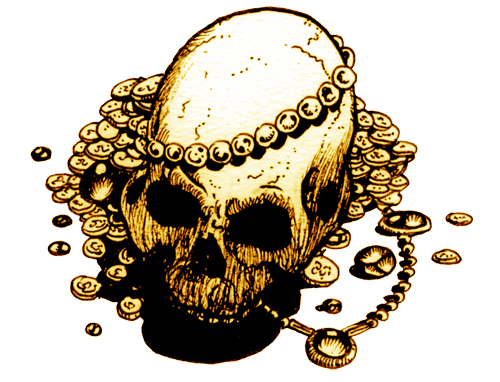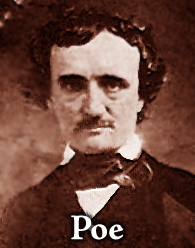The Cimmerian V3n10 — October 2006

Edited by Leo Grin | Illustrated by Dalmatius
40 pages
This issue was printed in two editions. The deluxe edition, numbered 1–75, uses a black linen cover with foil-stamped gold text. The limited edition, numbered 76–225, uses a gold cover with solid black text.
DELUXE COPIES DESTROYED: 17
LIMITED COPIES DESTROYED: 60
Features a long interview with Norris Chambers, one of the few surviving people who knew Robert E. Howard and his family, Howardian eulogies for both Sword-and-Sorcery writer David Gemmell and fan extraordinaire Darrell C. Richardson, a new poem by Weird Tales editor Darrell Schweitzer, Halloween illustrations of Howard’s “Wolfshead” and “Black Canaan,” and a meaty and contentious Lion’s Den.
EXCERPTS:
NORRIS: Now I know my mother said that Mrs. Howard said that people thought she was stuck up.
LEO: Ah, so Mrs. Howard was aware of the way people thought about her!
NORRIS: She said that people thought that about her, but Mama said she didn’t think she was, but she had kind of that attitude where people thought she was. My mother liked her all right. They got along real well.
She said that Mrs. Howard one day, talking about eating supper, said, “We had a nice little supper there planned just for us, and then so-and-so came in and we had to start all over again and cook supper!”
[laughter] That’s back when people used to come, you know, and they’d just stay for supper. Or spend the night, or whatever.
— from “Robert’ll Be Famous Someday” by Don Herron
“Death is a black horse that may halt in the night by any tent,” Robert E. Howard wrote in “The Lion of Tiberias.” As many TC readers will have heard, on July 28, 2006 the black horse halted by David Gemmell’s tent. Even while Gemmell carved out the largest and longest-lasting Sword-and-Sorcery empire of the era that followed the age dominated by Lancer, Zebra, Ace, Warner, Pocket Books, and DAW paperbacks, his appreciation of his predecessors was always keener than Akbitanan steel. Most of us have seen his blurbage for the Del Rey REH trade paperbacks: “I adore these books. Howard had a gritty, vibrant style — broadsword writing that cut its way to the heart, with heroes who are truly larger than life.” Much earlier, in one of his first major interviews (for the U.K. genre magazine Fear in 1988), he bemoaned heroic fantasies in which it is a foregone conclusion that the hero “will kill 75 wizards, a couple of armies, several dragons, a few werebeasts…and end up crowned king of Lemuria or somewhere.” The interviewer eagerly jumped in to ask if he meant characters “like Conan.” “Conan’s a bit different,” Gemmell demurred. “It was done rather well. There was a pace and vitality about Howard’s work that carried you through.”
— from “Dog Brothers” by Steven Tompkins
I’ve been through looking for a copy of Gent over the years. I’ve been to most every major city in the USA looking in all the nooks and crannies; not to mention London (yes, I’ve traveled those very same streets and stores that Alistair Durie walked the day he found his copy of Gent, but for me it was just on the wrong days), Oxford, Cambridge, the Lake Country, Bath, Wales, and skidillions of small, remote places in the U.K. and Europe. It’s now thirty-some years of looking since I first really became aware of the book’s existence via Glenn’s The Last Celt; just had to have one for the REH collection. And here ol’ Edward Gobbett has one basically drop out of the sky right into his hands, and there he is on p. 23 of TC, grinning away at us all just as happy as can be. Great!
— Jack Jones, writing in The Lion’s Den
Next, the homo-erotic business (which carries over into Mr. Kahan’s review of The Bloody Crown of Conan (p. 94–98). Mother of Pearl, what a load of crap! Mr. Kahan is entirely too Freudian for my taste. Robert E. Howard was a writer, and he “painted pictures” with words. Boxers use every means at their disposal to size up their opponents, including studying their physiques. Does this make Steve Costigan gay? Come on now, Mr. Kahan — give us a break.
— Ed Blohm, writing in The Lion’s Den




